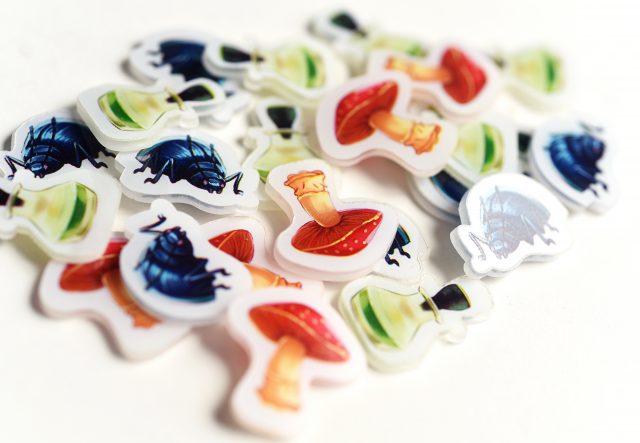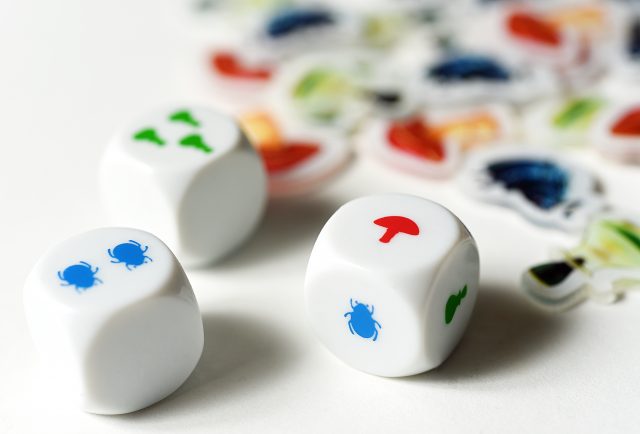There are a lot of inherent skills that a player can have that will give them an edge in a game. Being able to assess the odds comes in handy in a game like Settlers of Catan, having a good sense of spatial awareness compliments a tile-laying game like Honshu or Hanging Gardens, and having a command of trivial knowledge is going to be an asset in a game like Timeline or Trivial Pursuit. One skill that often gets overlooked, is the ability to read the other players at the table. How well do you know them? How do their past actions affect their future moves? What are they going to do next? The Potion is a simple and fast party game that in just 10 minutes of playtime, will have you asking those questions of the competition.
 Each player takes on the role of an alchemist, working to get rid of their ingredients to take control of the final potion. Everyone starts with two Mushrooms, Vials, and Beetles. The goal is to get down to just one type of ingredient to claim victory. First one or ones to do so, win the game.
Each player takes on the role of an alchemist, working to get rid of their ingredients to take control of the final potion. Everyone starts with two Mushrooms, Vials, and Beetles. The goal is to get down to just one type of ingredient to claim victory. First one or ones to do so, win the game.
Right off the bat, the packaging and components of the game will catch your eye. The Potion comes in what seems like a plastic pill bottle. Each of the ingredients is a colourful plastic piece, and the dice, although simple are chunky and clear to read.
 Rounds consist of one player rolling all three of the dice, and all players selecting one ingredient from their hand in the hopes of getting rid of it. The dice themselves have faces representing the three ingredients, as well as blank faces. Each die shows one, two, or three ingredients. So, the results might be three Beetles, one Vial, and a blank face, or three Mushrooms, two Mushrooms, and a Vial. Once the dice have been rolled, the real challenge begins.
Rounds consist of one player rolling all three of the dice, and all players selecting one ingredient from their hand in the hopes of getting rid of it. The dice themselves have faces representing the three ingredients, as well as blank faces. Each die shows one, two, or three ingredients. So, the results might be three Beetles, one Vial, and a blank face, or three Mushrooms, two Mushrooms, and a Vial. Once the dice have been rolled, the real challenge begins.
When players choose an ingredient from their hand, the goal is to be able to discard it. This can happen in one of two ways. If, once revealed, the total number of a certain type of ingredient matches the total of one of the die faces then everyone who revealed that ingredient can discard it into the bottle. For example, if one die shows two Beetles and two players reveal Beetles, they can discard them. However, if say, four people reveal Beetles, none of them get to get rid of them. There is another way to get rid of those pesky ingredients. If you look at the dice results and think too many people will be going for the same thing, you can choose to reveal an ingredient not present on any dice. If no players match a die result with their ingredients, then you get to get rid of yours. It’s a risk, but it can sometimes payoff.
The Potion is all about reading the results on the table and reading the players sitting around it. How are they going to approach the situation and how can you take that assumption and use it to your advantage?
 Like so many games, you’re going to be forced to make an educated guess, but that’s the fun of The Potion. When you’re wrong, you hold on to the ingredient, but when you make the right call, you get to add yours to the pill container with a satisfying clunk.
Like so many games, you’re going to be forced to make an educated guess, but that’s the fun of The Potion. When you’re wrong, you hold on to the ingredient, but when you make the right call, you get to add yours to the pill container with a satisfying clunk.
At higher player counts, The Potion adds to the variables, and making the right call can be tricky. It’s a lot of fun in its chaos, and the super short play time is just right. It is not a game to build an entire evening around, but The Potion is a great way to start or end an evening or to kill time at the pub with a crowd. It’s fast, fun, and highly portable. Give it a shot and try to get in the heads of the people you’re playing.
A review copy of The Potion was generously provided by FoxMind Games.
Comments
No comments yet! Be the first!